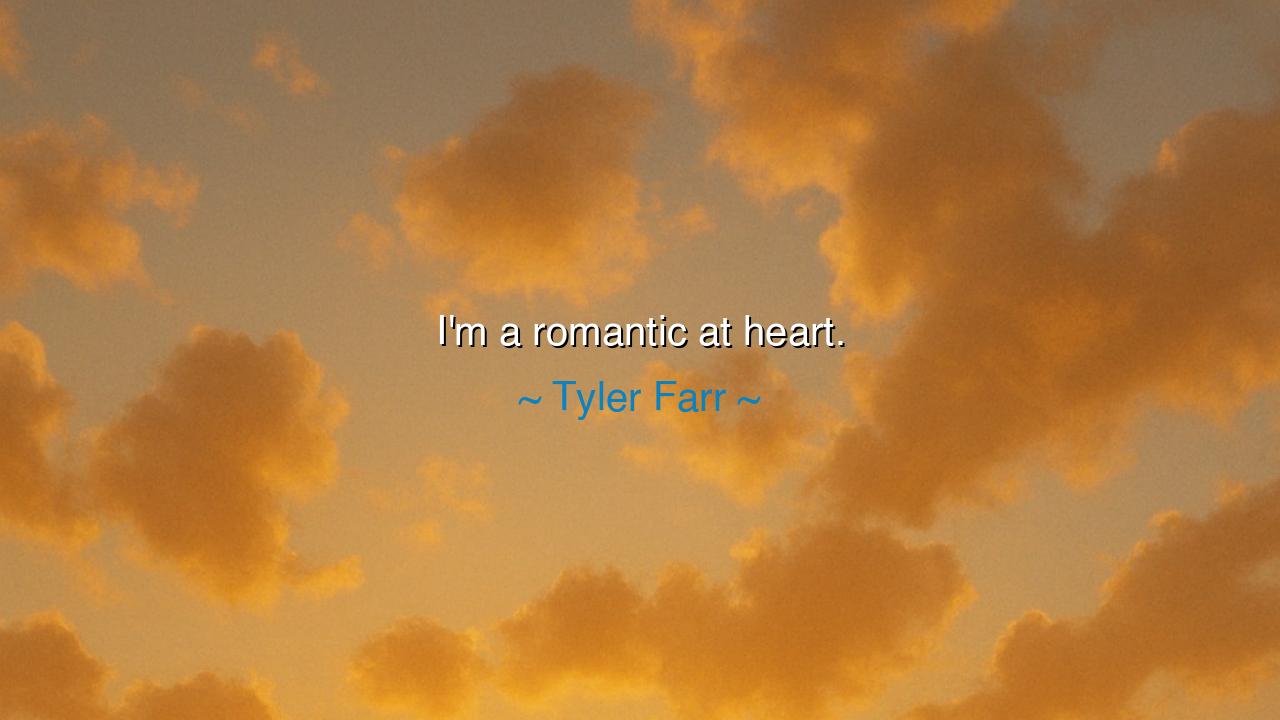
I'm a romantic at heart.






"I'm a romantic at heart," Tyler Farr states, and in this brief, yet profound declaration, we encounter the essence of what it means to be truly human. To be a romantic at heart is not merely to desire love, but to live with a deep sense of idealism, passion, and connection to the world around us. A romantic sees the beauty not only in the grand gestures of life but in its most subtle moments—the fleeting glance of a lover, the sound of a quiet song, the promise of something greater. It is a way of living that transcends mere existence and touches the realm of the eternal. Farr’s admission speaks to a longing that has always been part of the human condition: to seek meaning, to desire connection, and to cherish the profound in the everyday.
In the ancient world, to be a romantic was to connect with the divine. The Greeks and Romans, in their myths and poetry, placed great value on love and its transformative power. Consider Orpheus, whose music had the power to charm the gods themselves, whose love for Eurydice drove him to the very depths of the Underworld. Orpheus’ devotion was not born of mere infatuation, but of a romantic vision—a belief that love transcends death, that through love, one can achieve immortality. The ancient Romans too, through their epic tales and poetry, celebrated the passionate and sometimes tragic love stories of their gods and mortals alike. To be a romantic at heart, as Farr claims, is to embrace the belief that love is not simply a fleeting moment of joy but the foundation of existence itself.
To be a romantic is also to believe in the beauty of possibility, the belief that the world can be shaped by the force of desire and vision. Consider the Renaissance, when artists, writers, and philosophers sought to bring beauty and meaning into all aspects of life. The works of Leonardo da Vinci, Michelangelo, and Shakespeare were not simply technical feats—they were the products of men who viewed the world through a lens of romantic idealism, believing that art, love, and truth could elevate humanity. Their creations were infused with hope, and it is this hope—the belief that something greater could exist—that lies at the heart of romanticism.
Farr’s words also bring to mind the many poets and artists throughout history who sought to capture the essence of romanticism. Pablo Neruda, the Chilean poet, is a prime example of one who lived and wrote with a romantic soul. His poems about love, desire, and beauty evoke a sense of longing that is as timeless as the human spirit itself. Neruda wrote not just for the pleasure of words, but with the belief that love, when captured in language, could change the course of history. For him, poetry was a vehicle for transcending the mundane and reaching into the divine. Like Neruda, Farr’s declaration invites us to reflect on the role of romanticism in our own lives: do we embrace the world with a sense of wonder, hope, and passion, or have we allowed the harshness of the world to dim our belief in its beauty?
There is a deep wisdom in Farr’s acknowledgment of his romantic nature. For to be romantic is not merely to seek out love, but to embrace the world and life with an open heart. Romanticism teaches us to find beauty in the ordinary, to see beyond the surface and into the soul of things. Ralph Waldo Emerson, the American philosopher, believed in the power of self-reliance and the beauty of the individual spirit. He wrote, “The poet is the one who has the power to see the world as it should be.” This insight reflects the romantic belief that the world is not simply a collection of facts and material concerns, but a place of infinite possibility, shaped by the desires and passions of the heart.
The lesson here, then, is not only that we should cherish the romantic aspects of life but that we must live them fully. To be a romantic is not to live in a fantasy, but to see the world through the lens of possibility—to believe in love, in beauty, and in the potential of every moment. To be a romantic at heart means to embrace life with conviction and passion, to approach the mundane with a sense of wonder, and to create meaning in the world through our actions. Let us take inspiration from Farr’s words and live deeply, love passionately, and believe in the beauty of the world around us. For in doing so, we not only honor the romantic legacy that has shaped the greatest works of art, poetry, and philosophy, but we also find a deeper connection to the essence of what it means to be truly alive.
In our daily lives, we should seek out the romantic moments that might otherwise pass us by. Whether in a quiet conversation, a fleeting gesture of kindness, or the pursuit of a passion, let us be romantic in our view of the world. It is not enough to simply go through the motions; we must approach each moment with a heart open to the infinite possibilities that love, creativity, and hope can bring. In the end, it is the romantic spirit that will guide us to live with purpose and joy, making the world not just a place to survive, but a place to thrive.






AAdministratorAdministrator
Welcome, honored guests. Please leave a comment, we will respond soon